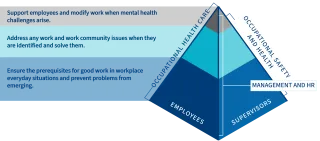The discussion on well-being and mental health in work life places high expectations on supervisors and directors. Declining development trends in the well-being at work and work ability of these groups have been identified, for example, in the "How is Finland doing?" follow-up study.
Supervisory work should be defined just like any other work duties. Therefore, every organization should have operational models in place to ensure that the supervisor is not left to deal with matters alone even in difficult situations.
"It is good to remember that supervisory work is a work duty, not a measure of one's excellence. Asking for help and collective reflection help with moving forward," says Kirsi Ahola, Docent in Occupational Psychology and Director at the Finnish Institute of Occupational Health.
Clear core responsibilities in the work community
At workplaces, it is worthwhile considering the maintenance and support of mental work ability as part of work planning. The methods for supporting mental health at the workplace can be summarised in a triangle model where the methods are divided into three levels. Time should be spent most on things that promote well-being at work, as these are the foundation for everything else. The workplace should consider how to build a good daily routine where it is possible to get things done.

Image. Means of supporting mental health at the workplace.
"Well-being is a continuum, so it is good to consider measures step by step. How do we ensure good prerequisites for working, how do we prevent problems from arising and how do we solve challenges and problems that have already arisen?" asks Kirsi Ahola.
Supervisors and employees play an active role in all stages of workplace everyday routines. Others support and lead the way: Top management defines goals for work ability management. HR specialists draw up the necessary operating models and processes. Occupational safety and health and occupational health care provide support and guidance for management, supervisors and employees.
"In order to achieve balance in work life, everyone should take care of their responsibilities well and co-operate," Kirsi Ahola summarises.
The model focuses on workplace actors, although many other factors also affect mental health and work ability.
Discussions at the workplace may well be limited
The supervisory role is currently often perceived as demanding.
"Supervisors feel that expectations towards them have increased. Employees may expect extensive sparring related to both their personal development and well-being challenges," says Pauliina Mattila-Holappa, Chief Specialist at the Finnish Institute of Occupational Health.
Discussions with team members may also be limited and directed towards the work progress and goals. The supervisor's role is not to serve as an unofficial therapist, a support person for private life or a mental health professional in their work community.
The Finnish Institute of Occupational Health has updated the "Supporting mental health at work" training material intended for HR professionals and supervisors. The training material can be used, for example, to practise discussing work performance and coping. The material also encourages HR professionals and supervisors to think about how to take care of the supervisor's own well-being.
Learn more
- Kirsi Ahola and Pauliina Mattila-Holappa share their insights on supporting and developing supervisory work in the episode “Who would comfort a supervisor?” of the Balance for Work Life webinar series, which can be watched on Yle Areena (in Finnish).
- The workplace instructor's material is available for download online (in Finnish).
- The triangle model of ways to support mental health will be published in full later this year.
Further information
- Kirsi Ahola, Director, kirsi.ahola [at] ttl.fi, +358 40 561 5692
- Pauliina Mattila-Holappa, Chief Specialist, pauliina.mattila-holappa [at] ttl.fi, +358 43 824 4041






